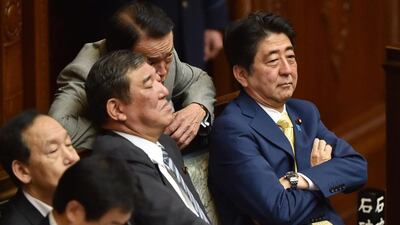TOKYO // Japanese prime minister Shinzo Abe’s coalition on Thursday approved legislation in the lower house of parliament that could see troops sent to fight abroad for the first time since World War Two, despite thousands of protesters overnight chanting and holding up placards reading “No War, No Killing”.
A lower house panel approval on Wednesday of the unpopular bills, which would drop a ban on collective self-defence or fighting to defend a friendly country like the United States, sparked a huge demonstration and more are planned.
The protest was reminiscent of those that toppled Mr Abe’s grandfather from the premiership 55 years ago after he rammed a revised US-Japan security pact through parliament.
Crowds of protesters — organisers said 100,000 — gathered near parliament. Many stayed well into the night, chanting and holding up placards reading “Abe, quit”, “No War, No Killing” and “Scrap the War Bills”. Protesters were assembling again on Thursday, although rainy weather could dampen the numbers.
The bills will now go to the upper house, and if no vote is taken after 60 days they will be returned to the lower house, where Mr Abe’s coalition can enact them with a two-thirds majority.
Mr Abe says a bolder security stance, welcomed by ally Washington, is essential to meet new challenges, such as those from a rising China.
“The security situation around Japan is getting tougher,” Mr Abe said after the vote, which was boycotted by the main opposition parties. “These bills are vital to protect the Japanese people’s lives and prevent war.”
Opponents say the revisions could entangle Japan in US-led conflicts around the globe and violate pacifist Article Nine of the US-drafted, post-war constitution.
“Opposition to the bill is growing louder,” said opposition Democratic Party leader Katsuya Okada just before the vote. “Prime minister Abe, you should admit you have not obtained the people’s understanding and immediately withdraw the bills.”
Mr Abe, who returned to office in 2012 pledging to bolster Japan’s defences and reboot the economy, has seen his support slip to around 40 per cent on voter doubts about the legislation and other policies, such as a plan to restart nuclear reactors.
* Reuters

